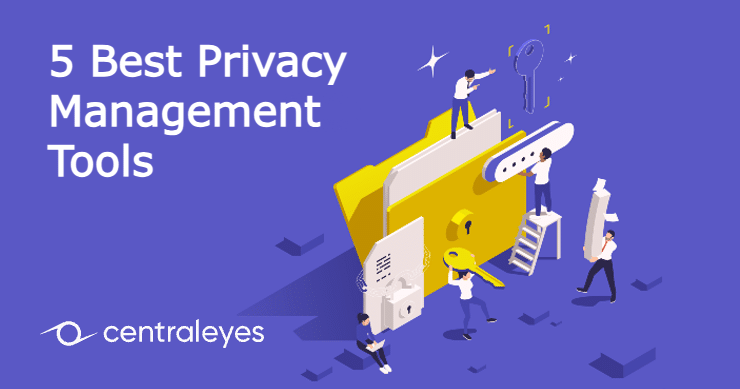High-profile data breaches have made data protection and privacy a hot subject. Hackers use more sophisticated methods to break network defenses and steal sensitive data on a large scale.
Malicious actors target personal data because of its value. They use this data to steal identities and access corporate accounts.
The consequences of data breaches go beyond financial impact. Indirect costs like brand reputation loss are sometimes the highest price companies pay for a data breach.

A Look at Some Recent Statistics
According to Business Wire, 83% of U.S. consumers say they will cease spending with a company for several months following a security breach, and more than one-fifth (21%) say they will never return to a company after the breach.
According to PwC’s 2023 Trust Survey, 84% of executives believe that customers have high trust in their firm, whereas only 27% of customers agree.
66% of U.S. consumers would not trust a company with their personal information if it had a data breach
According to the above source, 44% blame cyber attacks on a company’s inadequate security measures.
In light of these statistics, organizations are developing new data privacy and governance policies to deal with security breaches and regulatory compliance requirements.
In today’s global business environment, organizations operating across international borders face the formidable task of navigating various data privacy regulations. From the European Union General Data Protection Regulation (GDPR) to the California CPRA, compliance with these regulations is critical to avoid penalties and maintain stakeholder trust.
Privacy management software tools are the go-to address to navigate these challenges effectively.
3 Elements of Privacy Management
- the right to privacy and control of one’s personal data
- Procedures for proper handling of data to protect this right
- Compliance with data privacy and data protection requirements
Benefits of Privacy Management Tools
Good data privacy management offers clear advantages for businesses.
Building Customer Trust: Let’s face it. People want to do business with companies who care about securing their data. Demonstrate your dedication to data privacy and ethics with strong policies and a clean record, and you’ll earn the vital trust that is the foundation of long-term consumer loyalty.
Reducing Company Risk: By locating, identifying, classifying, minimizing, and securing sensitive data, firms can reduce the risk of security, privacy, and compliance.
Accelerate your Digital Transformation: Data privacy and governance programs enable you to secure data and establish the framework for digital transformation. They help you discover data locations throughout the organization, understand the systems, procedures, and consumers of the data, and build business rules and policies for data quality, security, and utilization.
Better Insurance Rates: Cyber insurance providers include data security in their actuarial analysis. Data governance management programs help demonstrate that your business has a sound risk management approach, which can lower your rates.
Comprehensive Documentation and Audit Trails: Detailed documentation and audit trails provide evidence of compliance during regulatory audits.
Global Operations: Standardizing privacy practices across jurisdictions ensures consistent compliance with varying privacy laws and regulations.
5 Best Data Privacy Management Tools
Here, we present a curated list of some of the leading privacy management software tools:
- Informatica
Businesses of all sizes can benefit from the Informatica Privacy management platform, a feature-rich program for managing sensitive company information. Informatica offers end-to-end solutions for web apps. All in one place: GDPR compliance, analytics and dashboards, cybersecurity services, integration with third-party tools and services, consent management, and privacy management software.
Informatica automates data privacy governance and secure data usage for enterprises. The platform integrates data discovery, risk assessment, and access tracking for transparency and security.
The platform helps teams classify, map, and track sensitive data. Automating and evaluating compliance with multifactor risk scoring saves firms time and money in privacy risk mitigation.
Informatica automates data masking and integrates with third-party risk remediation protocols to secure sensitive data.
- TrustArc
TrustArc has provided privacy programs and compliance services to over 1,500 firms worldwide for decades. They specialize in creating strong privacy programs and maintaining information governance and data security in the ever-changing digital ecosystem.
TrustArc’s all-in-one privacy management solution lets businesses access and manage data effectively while complying with worldwide privacy laws. This comprehensive platform combines expert guidance, governance, operations, and technology to automate compliance and build customer trust.
Businesses can acquire, process, and automate user data securely with TrustArc, enabling compliant and world-class experiences and managing complex workflows. Operations are simplified by the solution, which clarifies risks and duties and makes strategic recommendations for regulatory compliance and everyday privacy management.
- OneTrust Privacy and Data Governance Cloud
OneTrust is a complete privacy management platform that helps enterprises comply with worldwide privacy laws and data protection standards and build a culture of accountability. The platform’s real-time regulatory intelligence helps enterprises understand their data and vendors’ activities.
The platform automates resource-intensive privacy management operations to secure sensitive data, prevent incidents, and plan for response. Organizations can focus on strategic privacy objectives by unifying privacy management program operations, including privacy impact assessments, data mapping, and fulfillment of privacy rights requests. OneTrust provides current regulatory research, industry-specific privacy awareness training, and privacy policies to help teams comply with the newest regulations. OneTrust helps businesses demonstrate accountability by tracking privacy risks, incident response, and maturity of privacy programs.
User-friendly dashboards let users spot big patterns and potential incidents and improve the platform. OneTrust helps companies make faster, data-driven choices while maintaining compliance and trust.
- Securiti
By managing complex security, privacy, and compliance issues, Securiti helps organizations responsibly use data and the cloud. Their AI-powered technology helps businesses comply with data privacy laws and protect client data.
Securiti lets enterprises establish a fully functional privacy center with an automated backend, integrated privacy regulation intelligence, and an intuitive interface. It simplifies privacy by connecting to organized and unstructured data systems and instantly mapping personal data to unique identities.
By collecting, managing, and categorizing data assets and processing operations in a Sensitive Data Catalog, the platform helps organize data mapping. Processing data subject requests, automating privacy impact evaluations and privacy-by-design, assessing third-party privacy issues, and managing cookie and first-party consent across channels are further functions.
Automating breach notifications to meet global privacy requirements and managing and refreshing privacy policies and notices through a centralized dashboard simplifies the incident response process on Securiti’s platform.
- DataGrail
DataGrail is an integrated privacy solution that helps companies develop comprehensive privacy programs that empower users regarding privacy and identification. DataGrail arranges enormous amounts of data into simple privacy programs by simplifying emerging privacy regulatory processes.
DataGrail’s platform has hundreds of pre-built connectors for popular business systems, helping firms build a robust data foundation for their privacy strategies. The platform features continuous mapping, automatic data subject requests, and centralized preference management. DataGrail’s Privacy Control Center makes starting easy, letting organizations scale their privacy initiatives.
Start Getting Value With
Centraleyes for Free
See for yourself how the Centraleyes platform exceeds anything an old GRC
system does and eliminates the need for manual processes and spreadsheets
to give you immediate value and run a full risk assessment in less than 30 days
What To Look For in a Privacy Management Solution
Privacy compliance tools allow teams to collaborate on privacy management. They offer modules related to DSR/DSAR management, data discovery, and data mapping and provide oversight tools to govern a company’s privacy program.
Policy Management
Choose a solution that allows you to establish and oversee your data governance policies in one location. This ensures consistency and makes enforcing privacy policies throughout your company easy.
Data Discovery and Inventory
Look for technologies that allow you to identify and manage where your sensitive data is located within your firm. This includes identifying sensitive or personal information from diverse data sources and determining its level of sensitivity.
Simplified Compliance Support
Ensure the solution offers clear guidance for privacy and data protection laws. It should include pre-defined templates to assist you in meeting regulatory standards without requiring too much technical knowledge.
Personal Data Identity Mapping
Identity mapping is critical for complying with privacy standards. Choose a solution that allows you to map from one user identity to another, related user identity, and its affiliated info.
User-friendly Reporting and Audit Trails
Choose a solution that includes clear reporting and audit trails. This enables you to trace data usage, access, and changes over time.
Automatic Responses to Data Subject Requests
Look for features that automatically respond to data subject requests. Replying to consumer or data subject requests (DSR/DSAR) is integral to privacy management.
Risk Analysis
Choose a solution that will assist you in identifying and prioritizing privacy threats. This includes assessing the potential consequences of data breaches and implementing appropriate risk analysis and mitigation measures.
Data-centric Protection
Data-centric protection includes encryption, masking, fine-grained access controls, and integration with third-party tools, such as Active Directory (AD)/LDAP.
Support for Hybrid Environments
Choose a solution that supports all data sources, including structured and unstructured data, whether handled on-premises or in the cloud.
Types of Privacy Management Software
Privacy management software can vary in nature. Here’s an explanation of two variants:
Out-of-the-Box Solutions
Out-of-the-box privacy management software typically comes as a pre-packaged, ready-to-use solution. It’s designed to address common data privacy compliance needs and challenges organizations face without requiring extensive customization. These solutions often offer a comprehensive suite of features and functionalities, covering key aspects such as data inventory, consent management, incident response, and audit tools.
Organizations can implement these solutions relatively quickly, with pre-defined workflows, templates, and configurations aligned with regulatory requirements. Out-of-the-box solutions are usually user-friendly, with intuitive interfaces that require minimal training for users to get started.
While out-of-the-box solutions offer convenience and speed of implementation, they may not always fully align with an organization’s unique processes or requirements. Organizations may need to adapt their workflows to fit the software’s predefined structure.
Customizable Solutions with Integrated Tools
Some organizations opt for customizable privacy management solutions built using a combination of tools. These solutions typically involve integrating various software tools to create a tailored privacy management system that aligns precisely with the organization’s needs.
Customizable solutions offer the flexibility to adapt the software to closely match existing processes, organizational structures, and regulatory requirements. Organizations can select and integrate individual tools or modules based on their priorities. For example, they might choose a specific consent management tool, incident response platform, or data inventory system and integrate them into a cohesive privacy management framework.
While customizable solutions offer greater flexibility and customization options, they often require more time, resources, and expertise to implement and maintain. Organizations may need to work closely with software developers, IT teams, or third-party vendors to design, integrate, and optimize the solution according to their requirements.
Data Privacy A Business Imperative
In the end, data privacy isn’t just a matter of following the rules; it’s a matter of staying competitive by using data you have to create new value.
Investing in privacy management tools helps organizations adapt to evolving privacy laws and shows a commitment to ethical data handling. They also reduce risks, boost stakeholder confidence, and create a safer, more private digital future.
Start Getting Value With
Centraleyes for Free
See for yourself how the Centraleyes platform exceeds anything an old GRC
system does and eliminates the need for manual processes and spreadsheets
to give you immediate value and run a full risk assessment in less than 30 days






